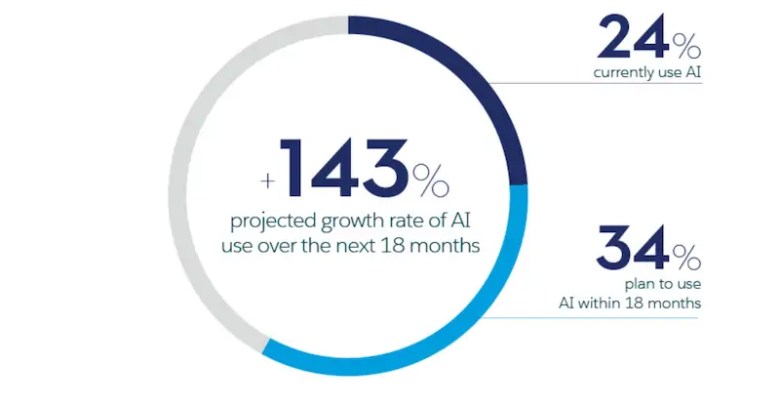Salesforce has announced new artificial intelligence and productivity solutions that empower customer service agents to focus more of their time on the human side of service — tasks that require social intelligence, critical thinking and creative problem solving skills. As customer service rapidly evolves from a reactive back-office function to one that impacts every stage of the customer’s journey, service agents are continually asked to do more. With new AI-powered recommendations, automated routing, and embedded productivity and collaboration capabilities, Salesforce is reimagining the agent experience to meet the needs of today’s connected customer.
Service agents are on the front lines of all customer interactions, from the moment a consumer begins researching products all the way through to post-sale support. And while agents have historically not had the necessary resources to deliver world-class customer experiences, that is now changing. According to the third edition of the Salesforce State of Service report released today, 82 percent of service leaders acknowledge their company’s customer service function must transform to stay competitive, and 77 percent of service organizations plan to make significant investments in agent training this year.
This is causing a dramatic shift in the service agent’s role, with 71 percent saying their jobs are more strategic than just two years ago and 75 percent saying their organizations now view them as brand ambassadors. Over the last three years Salesforce has embedded new AI capabilities into Service Cloud — such as Einstein Bots and Einstein Case Classification — to make the agent console more intelligent and the agent’s job easier.
Building on this, the AI innovations being announced today are:
Einstein Reply Recommendations uses natural language processing to instantly suggest the best responses to agents over chat and messaging, so they can save time and improve the quality of replies to customer inquiries. And using a machine learning model that learns what has worked over time, Einstein Article Recommendations automatically recommends the best knowledge articles to agents, giving them the information they need to solve cases quickly.
Einstein Next Best Action leverages business rules and predictive intelligence to suggest the best course of action at the point of maximum impact during agent-customer interactions, helping to increase customer satisfaction and uncover cross-sell opportunities.
Einstein Case Routing fully automates the routing process with machine learning that filters cases to the right queue or agent based on preset criteria, such as who is best qualified to solve them based on expertise or past outcomes.
Agents often spend more time hunting down answers than focusing on customer engagement given how difficult the collaboration process can be — corralling input from multiple teams, hunting for answers or documentation, and switching between multiple applications when doing so.
Now with Quip for Service, agents have a productivity and collaboration tool embedded directly within the agent console:
Quip for Service enables agents to co-author documents, bring in subject matter experts across the business to swarm on complex problems, and have live collaborative conversations directly within the case record.
Admins can build and easily publish flexible Quip templates in the agent console, as well as customize them based on different use cases and specific organizational needs.
Together, these new features will fundamentally change how service agents get their work done. For example, when a customer contacts a manufacturer about a malfunctioning refrigerator, Einstein Case Routing will automatically complete the case details and route it to the right agent for faster service. Einstein Article Recommendations will then automatically provide the agent with knowledge articles containing technical details on how to fix the product.
Alternately, if the customer reaches out via chat, Einstein Reply Recommendations will instantly suggest responses to the customer’s questions to the agent. Should the agent need to enlist product experts across the company to help fix the refrigerator, Quip for Service allows them to collaborate directly in the agent console, then capture that solution to be used again in the future. Finally, based on the conversation and the customer’s purchase history, Einstein Next Best Action flags that the customer qualifies for a free extended warranty, then walks the agent through the registration process. All of the guesswork is removed, and both the customer and agent have a better overall experience.
Empowering companies with the right technology only solves part of the challenge, as access to training is another significant obstacle customer service organizations face. To address this, Salesforce offers training programs and networking opportunities that provide managers and agents with the skills they need to bring their contact centers into the digital era and accelerate their career growth. These include the Trailblazers for the Future regional workshops hosted by Salesforce employees and customers, Trailhead content on service related issues, Service Cloud Specialist Certifications, and direct access to a community of 25,000+ service agents.
Einstein Next Best Action is generally available and included within Service Cloud Einstein, an add-on to Service Cloud, for $50 per user per month. Quip for Service is generally available and included within Quip Enterprise when added to Service Cloud for $25 per user per month. Einstein Article Recommendations, Reply Recommendations and Case Routing are currently in pilot. Pricing information will be made available at general availability.
TagsEinstein AI Quip for Service Salesforce Edit Post



